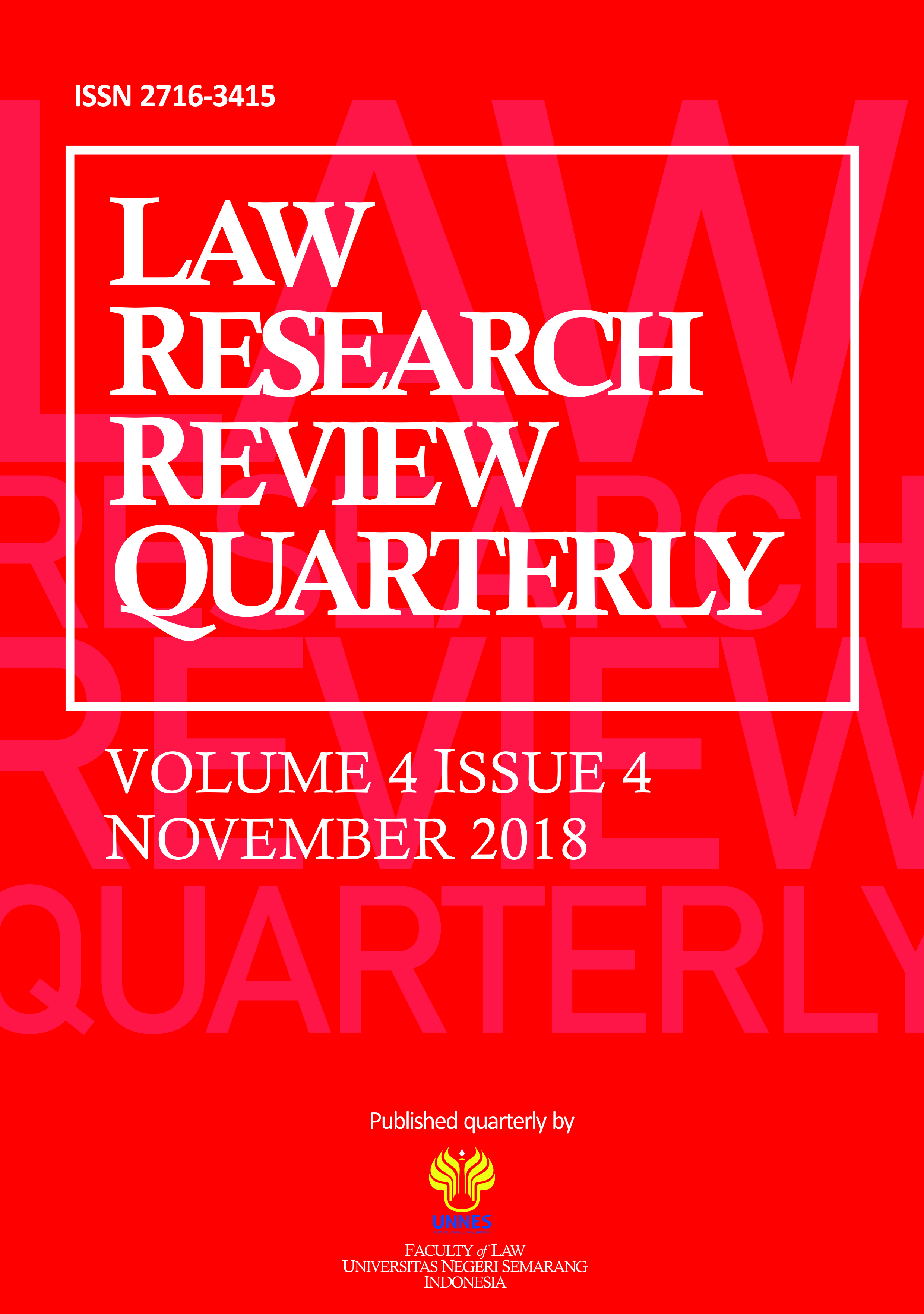Elections with Integrity: Initiating the Revocation of Political Rights for Corruption Inmates Selected through General Elections
Main Article Content
Abstract
For democracies, the implementation of general elections (elections) is a necessity. Article 22E Paragraph (1) of the 1945 Constitution says "General elections shall be held directly, publicly, freely, confidentially, honestly and fairly once every five years". The meaning of honesty in this context is binding for 3 (three) parties, namely the election organizer who will oversee the election from the stages of preparation, implementation and settlement, election participants (political parties and prospective participants) and the public as holders of voting rights. Election integrity has become very problematic at least from the many corruption cases involving election administrators. This can be a real visualization of the election integrity crisis in Indonesia. The crisis of integrity is increasingly apparent when corrupt convicts are still given the opportunity to run in the election. The problem in this research is First, what is the urgency of revoking political rights for prisoners of corruption. Second, how the ideas offered to regulate the revocation of political rights for prisoners of corruption. This research is a doctrinal research that uses primary and secondary legal materials. The method used is the normative approach. The results of the study concluded that first public office must be filled by people who are clean of corruption. Second, the application of revocation of political rights as a deterrent effect. Third, the need for a revision of the Anti-Corruption Law and the Election Law. Fifth, the granting of qualifications against convicted of criminal acts of corruption whose political rights will be revoked.
Article Details
All writings published in this journal are personal views of the authors and do not represent the views of this journal and the author's affiliated institutions. Author(s) are retain the copyrights of the Article. However, before publishing, it is required to obtain written confirmation from Author(s) in order to ensure the originality (Author Statement of Originality). The statement is to be signed by at least one of the authors who have obtained the assent of the co-author(s) where applicable.This work licensed under a Creative Commons Attribution-ShareAlike 4.0 International (CC BY-SA 4.0)
References
Ari Darmastuti dan Tabah Maryana. (2004). Sistem Kepartaian dan Pemilu di Indonesia. Universitas Lampung: Lampung.
Hendarmin Ranadireksa. (2015). Arsitektur Konstitusi Demokratik. Fokus Media: Bandung.
Husni Kamil Manik. (2016). Penyelenggaraan Pemilu dan Pemilukada dalam buku Feri Amsari “Pemilihan Umum Serentak. Rajawali Press: Jakarta.
Miriam Budiardjo. (2009). Dasar-dasar Ilmu Politik. Jakarta: Gramedia Pustaka Utama.
JURNAL/PENELITIAN
Ansori. (2016). “ Penghilangan Hak Politik perspektif Sistem Demokrasiâ€, Jurnal Ilmiah Pendidikan Pancasila, Th. 1, Nomor 1, hlm. 8
Muhtar Haboddin. 2012 Kekuasaan dan Koruptor di Tingkat Lokal . Volume. 4 No. 2 Halaman 1-2
Mardenis. (2013). Kontemplasi dan analisis terhadap klasifikasi dan politik hukum penegak ham di Indonesia. Jurnal Rechtsvinding, 2(3), 437-451.
Warih Anjari. (2015). Pencabutan Hak Politik Terpidana Korupsi Dalam Perspektif Hak Asasi Manusia (Kajian Putusan Nomor 537K/Pid.Sus?2014 dan Nomor 1195K/Pid.Sus/2014)â€, Jurnal Yudisial, Vol. 8No. 1, hlm. 40
Internet
Nasional kompas https://nasional.kompas.com/read/2018/09/21/09524011/total-38-caleg-eks-koruptor-diusung-di-pileg-2019-ini-daftarnya (diakses tanggal 5 November 2018)
Liputan Enam https://www.liputan6.com/pileg/read/3648941/daftar-nama-38-caleg-eks-narapidana-korupsi-yang-diloloskan-kpu (diakses tanggal 3 November 2018)
Komisi Pemberantasan Korupsi https://www.kpk.go.id/id/statistik/penindakan (diakses tanggal 30 Oktober 2018)
Komisi Pemberantasan Korupsi https://antikorupsi.org/id/news/pencabutan-hak-politik-koruptor (diakses tanggal 1 November 2018)
https://kolom.tempo.co/read/1045234/fenomena-vonis-ringan-koruptor (diakses tanggal 4 November 2018)
https://news.detik.com/berita/d-4003096/riset-icw-vonis-koruptor-rata-rata-2-tahun (diakses tangal tanggal 2 November 2018)
Peraturan Perundang-Undangan
Undang-Undang Dasar Negara Republik Indonesia Tahun 1945
Kitab Undang-undang Hukum Pidana (KUHP)
Undang-Undang Republik Indonesia Nomor 7 Tahun 2017 Tentang Pemilu
Undang-Undang Republik Indonesia Nomor 24 Tahun 2003 tentang Mahkamah Konstitusi
